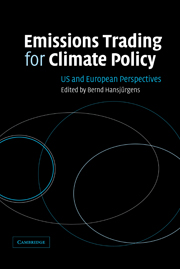Book contents
- Frontmatter
- Contents
- List of figures
- List of tables
- List of contributors
- Preface
- List of abbreviations
- 1 Introduction
- Part 1 Regulatory instruments for climate policy: theoretical aspects
- Part 2 The US approach to pollution control: lessons for climate policy
- 5 Implications of the US experience with market-based environment strategies for future climate policy
- 6 US experience with emissions trading: lessons for CO2 emissions trading
- 7 Climate change policy viewed from the USA and the role of intensity targets
- 8 Design issues of a domestic carbon emissions trading system in the USA
- Part 3 European policies to control greenhouse gases: the EU directive on emissions trading
- 14 Concluding observations
- Index
- References
7 - Climate change policy viewed from the USA and the role of intensity targets
Published online by Cambridge University Press: 22 September 2009
- Frontmatter
- Contents
- List of figures
- List of tables
- List of contributors
- Preface
- List of abbreviations
- 1 Introduction
- Part 1 Regulatory instruments for climate policy: theoretical aspects
- Part 2 The US approach to pollution control: lessons for climate policy
- 5 Implications of the US experience with market-based environment strategies for future climate policy
- 6 US experience with emissions trading: lessons for CO2 emissions trading
- 7 Climate change policy viewed from the USA and the role of intensity targets
- 8 Design issues of a domestic carbon emissions trading system in the USA
- Part 3 European policies to control greenhouse gases: the EU directive on emissions trading
- 14 Concluding observations
- Index
- References
Summary
Introduction
With the very emphatic withdrawal of the Bush Administration from the Kyoto Protocol, it might appear that there is no US policy on climate change. This view is reinforced by the 2002 Valentine's Day announcement from the Bush Administration that the cornerstone of its climate policy was to set a goal to reduce the greenhouse gas intensity of the US economy by 18 percent over the coming decade; never mind that this was roughly the rate at which the economy had been “de-carbonizing” over the previous decade.
But politicians come and go. This is particularly true in the case of climate change. It was President Bush's father who participated in the setting up of the treaty underlying the Kyoto Protocol, the Framework Convention on Climate Change, and no doubt climate policy will outlive the current President Bush. Furthermore, there is other positive activity on climate change in the United States, though relatively modest. There are federal government programs, mostly in research and development, as well as activities by state governments, private parties, and non-governmental organizations.
In this chapter we provide a review of the assorted actions that are being taken in the United States to deal with the climate change problem. The review is by no means comprehensive – just indicative of the types of activities that are under way. In addition, we consider some of the remaining problems that are not addressed by Kyoto, problems which must be addressed regardless of whether Kyoto becomes effective.
- Type
- Chapter
- Information
- Emissions Trading for Climate PolicyUS and European Perspectives, pp. 96 - 113Publisher: Cambridge University PressPrint publication year: 2005
References
- 3
- Cited by



